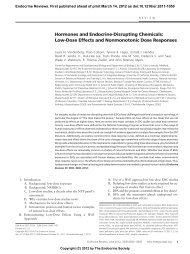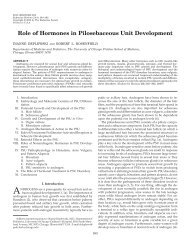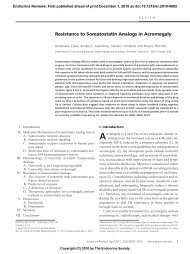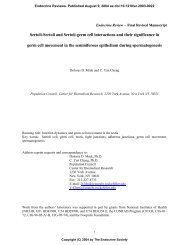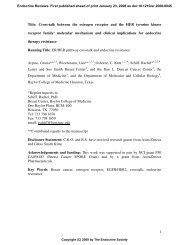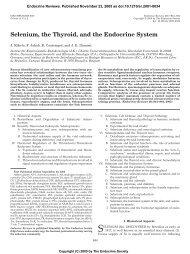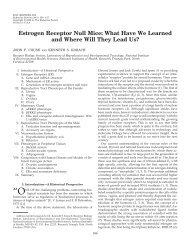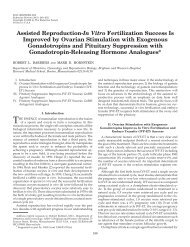1 BETA-CELL FAILURE IN DIABETES AND PRESERVATION BY ...
1 BETA-CELL FAILURE IN DIABETES AND PRESERVATION BY ...
1 BETA-CELL FAILURE IN DIABETES AND PRESERVATION BY ...
You also want an ePaper? Increase the reach of your titles
YUMPU automatically turns print PDFs into web optimized ePapers that Google loves.
44<br />
which GLP-1 modulates beta-cell-specific gene expression is unknown, but recent studies<br />
strongly suggest involvement of the homeodomain transcription factor PDX-1 .The<br />
capability of GLP-1 to regulate the expression of PDX-1, a major determinant in<br />
pancreatic organogenesis, has led investigators to propose that GLP-1 may be involved in<br />
the regulation of the mechanism(s) that governs endocrine phenotype specification during<br />
beta-cell differentiation and growth (187).<br />
Therapy with GLP-1 receptor (GLP-1R) agonists has also been associated with<br />
expansion of beta-cell mass via stimulation of beta-cell proliferation, promotion of islet cell<br />
neogenesis, and inhibition of beta-cell apoptosis (185, 190). Since GLP-1R is widely<br />
expressed and the observation that activation of GLP-1R signaling is coupled to stimulation<br />
of cell proliferation and enhanced cell survival it is viewed as a positive aspect of GLP-1<br />
action in the context of promoting expansion and survival of functioning beta-cells (182)<br />
and has generated great interest in the development of GLP-1R agonists for treatment of<br />
DM2. However, the proliferative and anti-apoptotic action of these agents may have<br />
theoretical consequences on tumor formation in either the endocrine or exocrine<br />
pancreas,considering that GLP-1R may also be expressed in the pancreatic ductal<br />
epithelium,a potential precursor site for the development of pancreatic cancer.Recently it<br />
was shown that although human pancreatic cancer cell lines may express a functional GLP-<br />
1R, activation of GLP-1R signaling by synthetic exendin-4 was not coupled to stimulation<br />
of cell proliferation or resistance to cell death in short-term studies (191). The levels and<br />
duration of exendin-4 exposure in the study in question were considerably different to<br />
levels of exposure to exendin-4, recently introduced in the treatment of DM2, that might be<br />
expected in human subjects.<br />
Furthermore, it was shown that human and non-human primate islet culture with<br />
excendin-4 and daily exendin-4 administration to transplant recipients (non-diabetic or<br />
diabetic NOD-SCID mice) increase both the survival and function of islets transplanted into<br />
the liver (192).<br />
In Table 2 are presented the animal data relative to the effects of GLP-1 and<br />
incretin mimetics (exendin-4 and liraglutide) on β-cells.



